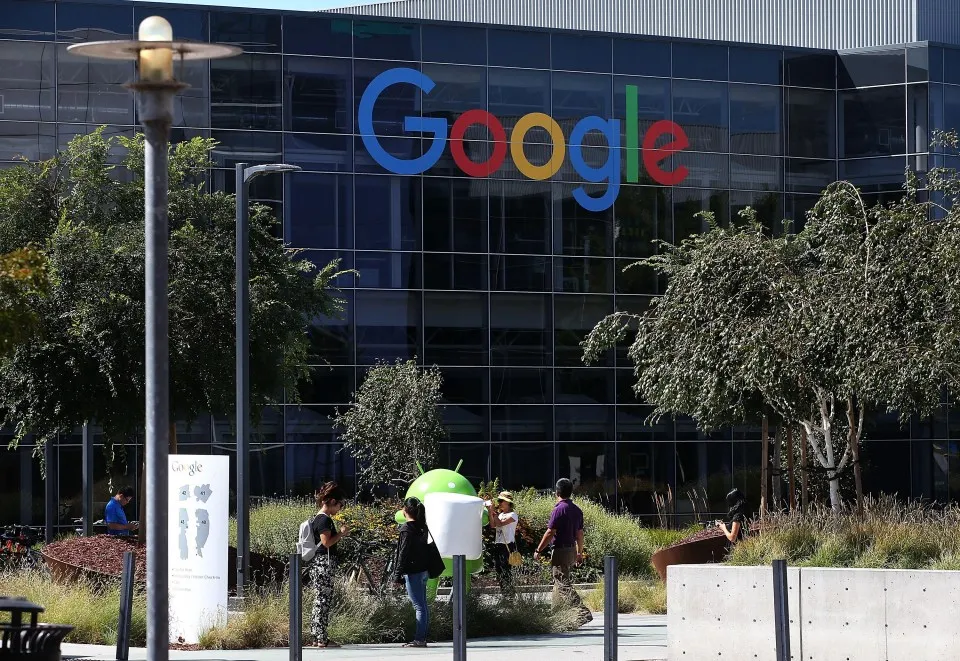
So when people looked for toys or holidays, the first products they’d see — often the only ones — would be those that paid Google to be there.
Still, given that the company raked in £63billion from advertising last year — more than every print newspaper and magazine on the planet — it can probably take the hit.
In an odd way, however, this ruling — while welcome — misses the point. Or rather, it only scratches the surface.
Yes, Google searches for stuff. But the firms controlled by its Alphabet holding company also make the Android phones that dominate the market.
And Gmail and YouTube and Google Maps. And laptops and TV dongles and self-driving cars and thermostats.
And artificial intelligence that can beat the world champion at Go, or scan the records of millions of NHS patients. And labs that are working to create fuel from sea water, or even conquer death.
No wonder that when the New York Times asked its readers to rank which of the big tech firms — Facebook, Amazon, Apple, Microsoft and Google/Alphabet — they couldn’t live without, Google was the runaway winner.
The question, of course, is why is Google doing all this?
The firm’s original mission was “to organise the world’s information and make it universally accessible and useful”.
That was a pretty extraordinary objective — to gather every fragment of knowledge, about everything.
But a few years ago, Google admitted it had outgrown it.
What Google now wants is not only to organise information, but serve it up. In its future, you’ll be kept constantly informed via your desktop, or your mobile, or a Google speaker in your home, or a holographic display in your glasses.
There’s a restaurant you’ll like over here. Your friend Gary is in that coffee shop a few metres away. You’ve got that big
meeting today, so perhaps the lilac tie?
The problem is that to do all this, Google needs to know you better than you know yourself so it can give you not just the right information but the right adverts.
That means getting all the data you can give it, and more — to get to the point where, as Alphabet’s executive chairman Eric Schmidt has put it: “We don’t need you to type at all because we know where you are. We know where you’ve been. We can more or less guess what you’re thinking about.”
The idea, Schmidt explained, “is to get right up to the creepy line and not cross it”.
As an example of what might be “creepy”, he suggested “implanting things in your brains” — at least not “until the technology gets better”.
Yet Google didn’t need to drill into our skulls to cross the creepy line.
It did that when it automatically read our emails to serve us adverts (a system which has only just been dropped). Or sent Street View cars cruising around the world, capturing pictures of unaware passers-by.
The pattern, as with the other tech giants, is simple.
Google succeeded because it made our lives better.
But in the process, it become so big and so rich that it acquired enormous power. Today, Google and Facebook rake in 83p of every new pound in online advertising revenue.
And falling down the Google search rankings is the equivalent of falling off the face of the earth.
Why hasn’t this power been checked?
Partly because Google has friends in very high places.
Back in 2012, US government officials recommended an even more sweeping monopoly investigation than the European Commission’s. The Obama administration said no — perhaps because Google was a major donor.
In the UK, David Cameron and George Osborne spoke at Google’s Zeitgeist conferences and basked in its favour.
Having friends like that certainly helped when it came to paying taxes.
For years, Google sold its ads in Britain but booked the profits in low-tax Dublin.
Even under the new “Google tax”, the firm is still paying just £36.4million on revenues of £1billion.
It argues that its UK offices do not count as a “permanent establishment” — even though it recently announced plans for a new London HQ that’s longer than the Shard is tall. In fact, for a firm whose motto was famously “Don’t Be Evil”, Google has often seemed to encourage it.
The Manchester bomber reportedly learnt his craft via YouTube videos — and PM Theresa May, alongside security chiefs, has lambasted the firm (and other internet giants) for being slow to take down or report extremist material.